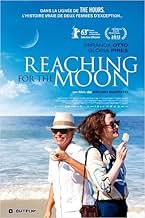IMDb RATING
7.0/10
3.7K
YOUR RATING
A chronicle of the tragic love affair between American poet Elizabeth Bishop and Brazilian architect Lota de Macedo Soares.A chronicle of the tragic love affair between American poet Elizabeth Bishop and Brazilian architect Lota de Macedo Soares.A chronicle of the tragic love affair between American poet Elizabeth Bishop and Brazilian architect Lota de Macedo Soares.
- Awards
- 9 wins & 21 nominations total
Featured reviews
Reaching for the Moon is the kind of movie everyone hopes for but no one makes: a gay romance where "gay romance" is not the premise. Director Bruno Barreto focuses instead on how Elizabeth Bishop and Lota de Macedo Soares challenged and changed the world and each other in other ways, and that was absolutely the right choice - these women and their story are fascinating and make for top class entertainment.
And it is entertaining. Considering the characters' issues and the story's ending it could have been drab, but the film is always lively and engaging. It flies by. Bishop takes herself very seriously, but Barreto maintains a sense of humor about it and makes fun of her just enough to keep her melodrama under control. An added bonus is that Miranda Otto gets to show off her underrated and underused comedic chops; one particular drunk scene is priceless. Glória Pires is dynamic and fiery as Lota but Otto is the real star, channeling Greta Garbo and Deborah Kerr in a gracefully commanding performance. She doesn't shy away from Bishop's spikiness, but her screen presence is so compelling that as much as we might be frustrated with her character, we can't take our eyes off her. Thanks to her constantly surprising performance, an eclectic ensemble cast, breathtaking visuals, and assured direction, Reaching for the Moon pulses with energy and is a breath of fresh air in an era of stuffy and bland biopics.
Highlights: Shots of Rio de Janeiro that belong on postcards; a performance from Miranda Otto that would have won an Oscar in 1937; the assertion that some things are more important than whether a person is gay
Verdict: Watch this with your parents instead of Blue Is the Warmest Color
And it is entertaining. Considering the characters' issues and the story's ending it could have been drab, but the film is always lively and engaging. It flies by. Bishop takes herself very seriously, but Barreto maintains a sense of humor about it and makes fun of her just enough to keep her melodrama under control. An added bonus is that Miranda Otto gets to show off her underrated and underused comedic chops; one particular drunk scene is priceless. Glória Pires is dynamic and fiery as Lota but Otto is the real star, channeling Greta Garbo and Deborah Kerr in a gracefully commanding performance. She doesn't shy away from Bishop's spikiness, but her screen presence is so compelling that as much as we might be frustrated with her character, we can't take our eyes off her. Thanks to her constantly surprising performance, an eclectic ensemble cast, breathtaking visuals, and assured direction, Reaching for the Moon pulses with energy and is a breath of fresh air in an era of stuffy and bland biopics.
Highlights: Shots of Rio de Janeiro that belong on postcards; a performance from Miranda Otto that would have won an Oscar in 1937; the assertion that some things are more important than whether a person is gay
Verdict: Watch this with your parents instead of Blue Is the Warmest Color
Overall had a very good impression of the movie. I think it balanced well certain aspects... especially in the portrayal of their romance. They avoided being overly prudish and that made the romance seem more real. Without getting too kinky and losing focus. The contrast between the two characters is really interesting.
The actress Gloria Pires who portrays Lota de Macedo Soares has worked in dozens of soap operas and that sometimes comes through in her films, but not this time thankfully. She so embodies the force of nature that was Lota and this comes through the screen very well. I felt like I was seeing a member of my old Rio family... so her amazing portrayal was certainly the highlight of the film for me.
PS: Being a Macedo Soares myself (but too young to have known Lota)... there might be a bit of bias in my review.
The actress Gloria Pires who portrays Lota de Macedo Soares has worked in dozens of soap operas and that sometimes comes through in her films, but not this time thankfully. She so embodies the force of nature that was Lota and this comes through the screen very well. I felt like I was seeing a member of my old Rio family... so her amazing portrayal was certainly the highlight of the film for me.
PS: Being a Macedo Soares myself (but too young to have known Lota)... there might be a bit of bias in my review.
This is a beautifully filmed movie about the lives of two exceptional women whose lives collided in the early 50s and went on for 17 years. Oh - it's a true story, BTW.
The locations are spectacular in a quiet way and worth the watch on their own. They added one star.
I am ashamed to say I was not aware of Elizabeth Bishop. Now I am looking forward to reading her material.
Hope you enjoy this film.
The locations are spectacular in a quiet way and worth the watch on their own. They added one star.
I am ashamed to say I was not aware of Elizabeth Bishop. Now I am looking forward to reading her material.
Hope you enjoy this film.
Lovely. A story here that is not overshadowed by the relationships, politics, or agenda. It is, simply beautifully filmed, the beaches of Rio De Janeiro, the beautiful home Lota has deigned in part to accommodate her new lover, poet Elizabeth Bishop, completely played by Miranda Otto.
Otto is at once restrained yet yearning, a Vassar graduate visiting her friend, who initially is puzzled (and indeed overwhelmed) by the beauty and passion of South America.
She plays the American New England spinster type well, without a stereotype here. We can feel she wants, and NEEDS to break free from societal restraints.
The filming of the rain forests, the owls at night, the visuals are incredible. Lota Soares was politically connected and designed the park near Carioca beach, the title infers, reaching for the moon has so may more connotations for each woman.
What is most refreshing is the way this film is written, sensitive to the issues each woman experiences, it is an individual and a private journey.
The actress portraying Carlotta Soares is affecting and sad, and Miranda Otto is quite believable as Bishop. The story is beautiful and sad, and the scenery of Brazil is not to be missed, simply beautiful, and beautifully filmed. 10/10
Otto is at once restrained yet yearning, a Vassar graduate visiting her friend, who initially is puzzled (and indeed overwhelmed) by the beauty and passion of South America.
She plays the American New England spinster type well, without a stereotype here. We can feel she wants, and NEEDS to break free from societal restraints.
The filming of the rain forests, the owls at night, the visuals are incredible. Lota Soares was politically connected and designed the park near Carioca beach, the title infers, reaching for the moon has so may more connotations for each woman.
What is most refreshing is the way this film is written, sensitive to the issues each woman experiences, it is an individual and a private journey.
The actress portraying Carlotta Soares is affecting and sad, and Miranda Otto is quite believable as Bishop. The story is beautiful and sad, and the scenery of Brazil is not to be missed, simply beautiful, and beautifully filmed. 10/10
Reaching for the Moon (2013)
Wonderful! The story of the Brazilian years of the great North American poet, Elizabeth Bishop. There are so many beautiful aspects to the characters, their setting, and their relationships it's hard to know where to begin. And even better, on top of all this, is the historical recreation of the times, and the changing political climate of Brazil. It's touching and uplifting and tragic.
The original title of this is "Flores Raras" because these were indeed rare people, and doing beautiful things. And yes, they were reaching for the moon but you might rather say they reached the moon. Succeeding at something is more than literally fulfilling.
The plot has a slightly meandering, unfamiliar arc through the main events, and there are times when you think one thing and then suddenly another happens. Don't blame bad writing, but rather realize that this is how life is, and how it really was. Remember as well that these are artists of privilege at work, they have money and education and act with a kind of license and liberation that we all should feel. And so it's unpredictable.
As a kind of true insight into the poetic process you might find few parallels in the movies. You learn their temperaments, and how circumstances make the artist and the poet come to their best. The intimate circumstances are about love, a really true deep love that grows between these two women. Their professional needs reinforce and conflict with their personal needs, but they make it work.
The outside circumstances are hard to understand from 2014. Brazil was once a very different country, filled with far more freedom and sense of liberation. (This seems to be a direction that are pointed in again, though going through fits and starts.) But the world in post-War Brazil was one of possibility. It was a haven (not just for ex-Nazis) and a growing "New World," but it was also stuffed with poverty (which the movie ignores), a legacy still at hand.
And this is exciting stuff. The movie moves mostly through the confines of their big, gorgeous estate in the hills, but it also shows us the city, and the larger world. So Bishop and Lota de Macedo Soares, an important architect of the era. grow and suffer and see their world fall apart around them (Brazil fell under dictatorship in the mid 1960s). It's filmed with utter beauty, the acting is sharp and convincing, and the writing (not surprisingly) is fluid and tight. Great stuff.
Wonderful! The story of the Brazilian years of the great North American poet, Elizabeth Bishop. There are so many beautiful aspects to the characters, their setting, and their relationships it's hard to know where to begin. And even better, on top of all this, is the historical recreation of the times, and the changing political climate of Brazil. It's touching and uplifting and tragic.
The original title of this is "Flores Raras" because these were indeed rare people, and doing beautiful things. And yes, they were reaching for the moon but you might rather say they reached the moon. Succeeding at something is more than literally fulfilling.
The plot has a slightly meandering, unfamiliar arc through the main events, and there are times when you think one thing and then suddenly another happens. Don't blame bad writing, but rather realize that this is how life is, and how it really was. Remember as well that these are artists of privilege at work, they have money and education and act with a kind of license and liberation that we all should feel. And so it's unpredictable.
As a kind of true insight into the poetic process you might find few parallels in the movies. You learn their temperaments, and how circumstances make the artist and the poet come to their best. The intimate circumstances are about love, a really true deep love that grows between these two women. Their professional needs reinforce and conflict with their personal needs, but they make it work.
The outside circumstances are hard to understand from 2014. Brazil was once a very different country, filled with far more freedom and sense of liberation. (This seems to be a direction that are pointed in again, though going through fits and starts.) But the world in post-War Brazil was one of possibility. It was a haven (not just for ex-Nazis) and a growing "New World," but it was also stuffed with poverty (which the movie ignores), a legacy still at hand.
And this is exciting stuff. The movie moves mostly through the confines of their big, gorgeous estate in the hills, but it also shows us the city, and the larger world. So Bishop and Lota de Macedo Soares, an important architect of the era. grow and suffer and see their world fall apart around them (Brazil fell under dictatorship in the mid 1960s). It's filmed with utter beauty, the acting is sharp and convincing, and the writing (not surprisingly) is fluid and tight. Great stuff.
Did you know
- TriviaFour paragraphs appear between the end of the film and the beginning of the credits.
1. "Few women write major poetry. Only four stand with our best men: Emily Dickinson, Marianne Moore, Elizabeth Bishop and Sylvia Plath." - Robert Lowell
2. "I'd rather be called the 'The 16th Poet' with no reference to my sex, than one of 4 women - even if the other three are pretty good." - Elizabeth Bishop
3. Elizabeth Bishop died in 1979 in the United States. She is considered on the most important poets of the English language.
4. In 2012, UNESCO declared the city of Rio De Janeiro a World Heritage site. The Flamengo Park is one of its main attractions.
- GoofsOpening in 1951 but Bobby Vinton singing Blue Velvet was not until 1963.
- Quotes
Elizabeth Bishop: It's OK. I'm not drunk. I'm just crying in English.
- Crazy creditsNine of the main performers (the first 10) are listed in the credits without the name of their character. Only Treat Williams is credited as his character, Robert Lowell.
- ConnectionsReferenced in Programa do Jô: Episode dated 26 August 2013 (2013)
- How long is Reaching for the Moon?Powered by Alexa
Details
- Release date
- Country of origin
- Official sites
- Languages
- Also known as
- The Art of Losing
- Filming locations
- Production companies
- See more company credits at IMDbPro
Box office
- Gross US & Canada
- $45,502
- Opening weekend US & Canada
- $14,573
- Nov 10, 2013
- Gross worldwide
- $1,534,391
- Runtime
- 1h 58m(118 min)
- Color
- Aspect ratio
- 1.85 : 1
Contribute to this page
Suggest an edit or add missing content


























